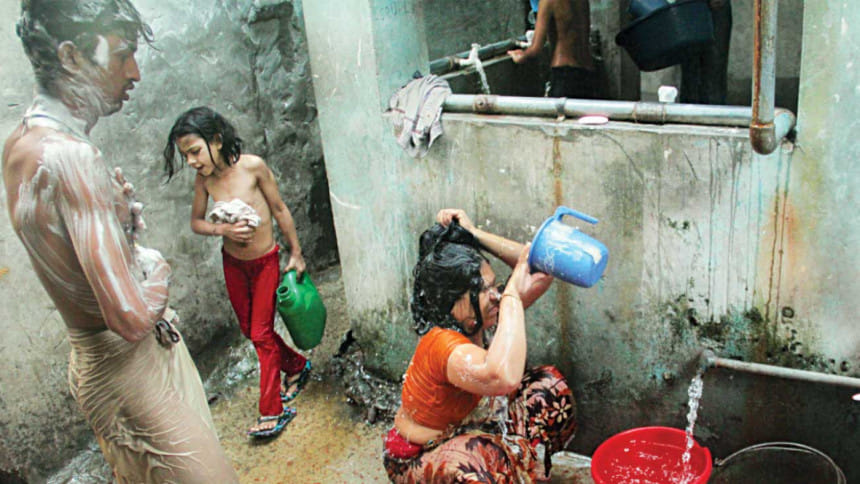WHERE THE CONDEMNED ROT

When one walks into the Bihari Camp in Mohammadpur, locally referred to as the "Market Camp," it is as though one has left the city and entered a different world- the world of the condemned. An overwhelming stench of garbage and stagnant water hits you with violent force. The narrow alleyways, littered with garbage, human and animal waste, are barely wide enough for an average sized person to squeeze through. As you make your way toward the heart of the camp, you hear loud chatter and music, a crowd of people are seen standing around a flowing tap holding buckets, pots and plastic bottles, watching a group of men, women and children bathing and washing clothes. "There are 12000 people in this camp and about 6000 of us use this one tap to bathe, wash, drink, cook-everything," says Nargis Parveen, who has grown up in the camp, "There has been a water crisis here for as long as I can remember-this is the way we live."
Two years ago, the NGO, OBAT-Helpers had set up a few taps in the area that have lessened what used to be a worse situation in these camps. Yet, each resident waits an hour to two every morning to get access to water. "At times, we don't have electricity for 5 to 6 hours a day because we cannot pay the bill. We have no water during that time," says Najma Begum, another resident. "The farthest house from this tap is ten minutes away, and people come here quite a few times each day to fetch water. We only have 20 toilets to accommodate all 12000 of us. It is very difficult to live like this," she tells us.
A few roads down, lies another camp, the Geneva Camp, which houses 35,000 people. "We have only two taps here for all our residents," says M Shoukat Ali, the General Secretary of the Stranded Pakistanis General Repatriation Committee (SPGRC). "The water that comes out of these taps are foul smelling and filthy, and people are forced to drink it because they have no choice. We only have 228 toilets for all the residents and half of them are out of order. We have regular outbreaks of diseases such as cholera, dysentery, typhoid and dengue," he continues, "We have one water filter and I let the children from our school drink from it. It is insufficient. The city corporation wants nothing to do with us, they refuse to clean our camp or let us dispose of our garbage the way everyone else does."
Ali Hossain, a resident of Geneva Camp who has been here since our independence, says, "Waiting for the bathroom every morning is difficult for me, I am an old man. There are some like me who cannot wait an hour and soil themselves. We aren't even allowed to preserve our dignity."
The open toilets, some with no doors, are surrounded by filth that needs to be scooped out by the residents themselves each day. Only one toilet for women has a roof. The residents in this camp, who live in 8ft by 8ft rooms, know no privacy, basic hygiene or any of their basic human rights. Although they have been granted citizenship they are not treated as our equals.
On March 22, the World Water Day, let us think of the plight of people all over our country who are deprived of their right to clean water and healthy lives- an issue that needs to be addressed immediately.

 For all latest news, follow The Daily Star's Google News channel.
For all latest news, follow The Daily Star's Google News channel. 



Comments